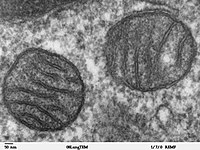
Photo from wikipedia
Ochratoxin A (OTA) is a common natural contaminant found in human and animal food worldwide. Our previous work has shown that OTA can cause oxidative DNA damage, G2 arrest and… Click to show full abstract
Ochratoxin A (OTA) is a common natural contaminant found in human and animal food worldwide. Our previous work has shown that OTA can cause oxidative DNA damage, G2 arrest and malignant transformation of human gastric epithelium (GES-1) cells. Mitochondria are considered to be target for the action of many cytotoxic agents. However, the role of mitochondria in the cytotoxicity of OTA remains unknown. The aim of this study is to explore the putative role of mitochondria on OTA cytotoxicity by analyzing mitochondrial changes in GES-1 cells. The results showed that OTA treatment (5, 10, 20 µM) for different times caused increases in the production of reactive oxygen species, and induced mitochondrial damage, shown by loss of mitochondrial membrane potential (ΔΨM), and decrease in cellular ATP concentration. Subsequently, the mitochondrial apoptotic pathway was activated, presented by increase of apoptotic rate and activation of apoptotic proteins. Autophagic cell death was also triggered, demonstrated by the conversion of light chain 3B (LC3B)-I to LC3B-II and elevated levels of green fluorescent protein-LC3 (GFP-LC3) puncta. Moreover, Parkin-dependent mitophagy was also activated presented by the colocalization of MitoTracker with LysoTracker or GFP-LC3 puncta. The inhibition of autophagy and mitophagy by inhibitors or siRNA attenuated the toxic effect of OTA on cell growth. Interestingly, OTA treatment also enhanced mitochondrial biogenesis confirmed by activation of AMPK/PGC-1α/TFAM pathway and promoted cell survival. Collectively, the effects of OTA on mitochondria of GES-1 cells are complex. OTA could cause mitochondrial function disturbance, apoptotic and autophagic cell death and also induce mitochondrial biogenesis.
Journal Title: Archives of Toxicology
Year Published: 2019
Link to full text (if available)
Share on Social Media: Sign Up to like & get
recommendations!